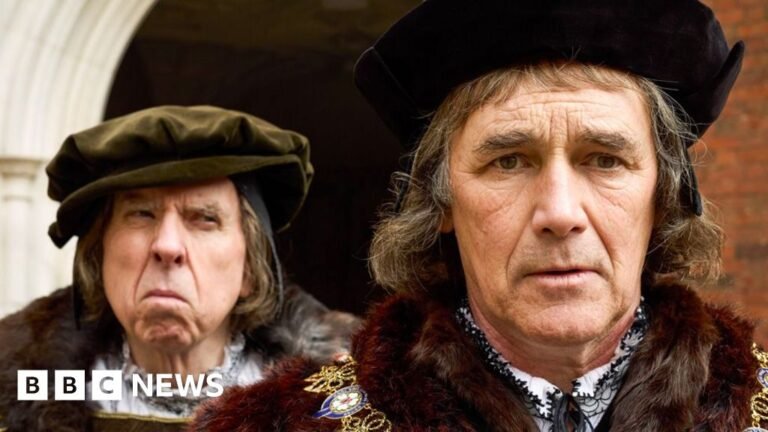Newsnight
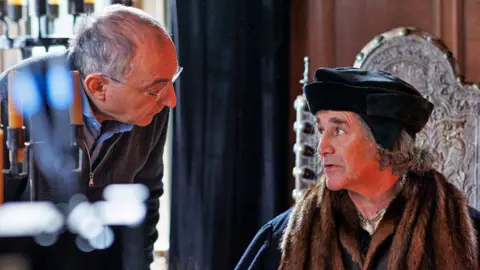 BBC
BBCThe director of acclaimed interval drama Wolf Corridor says filming of final yr’s second collection was practically known as off weeks earlier than it was attributable to start due to funds pressures.
Peter Kosminsky advised BBC Two’s Newsnight they finally opted to axe expensive exterior scenes in Wolf Corridor: The Mirror and The Gentle, that means virtually all the things within the Tudor drama, screened by the BBC, grew to become “conversations in rooms” as an alternative.
He argues public service broadcasters together with the BBC and ITV can now not afford to make high-end British drama.
The Bafta and Golden Globe-winning director is asking for a 5% levy on UK subscription streaming revenues, with the proceeds collected for a British cultural fund.

Kosminsky advised the BBC that six weeks earlier than capturing started, having already lower sure props, places, costumes and forged members, he and the producer determined the hole was nonetheless “too nice” to go forward with making The Mirror and The Gentle.
“That is not one thing that has ever occurred to me earlier than, in all of the years I have been making programmes, that you just really should cease six weeks from manufacturing.”
Kosminsky has beforehand revealed that he – alongside Sir Mark Rylance, who performed Thomas Cromwell, govt producer Colin Callender and Oscar-winning author Peter Straughan – took vital pay cuts to get the programme over the road.
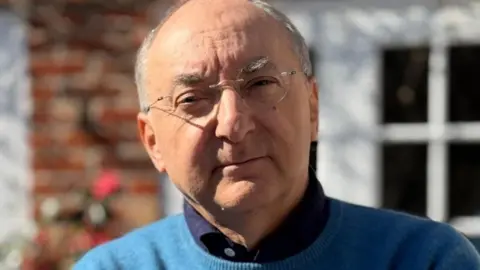
He mentioned the unique script “had many scenes set exterior, many scenes involving horses, we had a complete joust, a unprecedented scene as conceived by Hilary Mantel, the unique novelist – and we needed to lower all the things”.
He mentioned he was nonetheless “extremely happy with what we have achieved, and the response overwhelmed us all”.
However the authentic idea was a programme with “extra contemporary air in it, the place you bought extra of a way of Tudor society out on this planet, and the lives these folks lived after they weren’t within the throne rooms, palaces and exquisite eating rooms”.
Kosminsky mentioned issues had acquired worse since he filmed the drama, which was broadcast in November.
Now, he argues, public service broadcasters wouldn’t have the ability to afford to fee Wolf Corridor or Mr Bates vs the Put up Workplace, the landmark ITV drama concerning the Put up Workplace scandal.
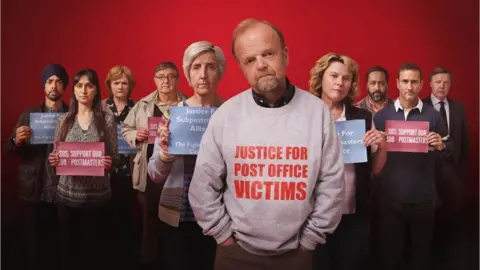 ITV
ITVIn the future within the not too distant future, he warns, British audiences will discover most of these programmes are “gone”.
Kosminsky additionally believes there’s “no method” the BBC or ITV might afford to make Adolescence, the present hit present from Netflix about a youngster accused of homicide.
Adolescence author Jack Thorne thinks conventional broadcasters might have made the drama, however they might have needed to lower a number of the costliest scenes.
“It will have been a barely completely different model of it,” Thorne advised the BBC.
“In episode two, I wrote a hearth drill that concerned 300 extras. These 300 extras needed to be employed for 10 days. That’s an terrible lot of cash. So all this stuff would have been troublesome on a public service funds.
“I feel we might have completed it, it simply would have been very completely different. And honestly, it most likely would have wanted co-finance from overseas, and the issue in the mean time is that finance has disappeared.”
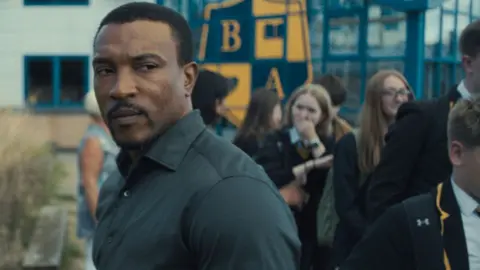 Netflix
NetflixThe influence of Covid and the 2023 US actors’ and writers’ strikes, in addition to increased vitality prices, are a number of the causes usually given for the growing prices of TV manufacturing.
And Kosminsky shouldn’t be alone in arguing that the arrival of streaming platforms has inflated costs so dramatically that the general public service broadcasters have been unable to maintain up.
Patrick Spence, the chief producer behind Mr Bates vs the Put up Workplace, advised the BBC this was “a severe problem”.
“Not solely would Mr Bates not get funded as we speak, however I would not even have began creating it,” he mentioned.
Former subpostmaster Sir Alan Bates, whose story was central to the programme named after him, mentioned it could be “an actual disgrace” if these sorts of dramas might now not be made.
Mr Bates vs the Put up Workplace meant “lots of people noticed for the primary time the kind of hell occurring within the background within the Put up Workplace, the actual miscarriage of justice occurring proper throughout the nation”, he mentioned.
Spence mentioned the worth of creating dramas had risen similtaneously the worldwide funding mannequin had dried up for most of these exhibits. Later this yr, his ITV drama The Hack, concerning the cellphone hacking scandal, by Adolescence author Jack Thorne, will air within the UK.
Spence mentioned there was “no method” he might increase the cash to fund that programme now.
Streaming levy
Figures out final month from the BFI confirmed £5.6bn was spent on excessive finish TV and movie manufacturing within the UK in 2024. However home UK programmes accounted for £598m, down 22% on the earlier yr.
Kosminsky argues {that a} levy on the streamers would put the UK consistent with another European international locations that use the proceeds to fund home content material, resembling France and Denmark.
However with many streamers based mostly within the US, would the UK authorities tackle Donald Trump’s administration?
In February, a White Home memorandum referenced levies on US streaming companies, calling them “one-sided, anti-competitive insurance policies” that “violate American sovereignty”.
On Thursday, as she accepted an award from the Broadcasting Press Guild, Jayne Featherstone, govt producer of Netflix’s Black Doves, mentioned the UK was “prone to shedding the very tales that outline us”.
“We’re within the forty fifth minute of the pilot episode, and we have got 5 minutes left to cease the bomb from going off,” she mentioned.
She not too long ago advised a Home of Commons committee she wish to see an uplift in tax aid for top finish tv, just like the one already given to the movie sector.

